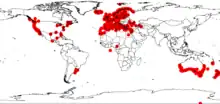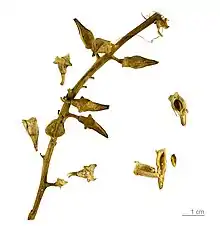| Cakile maritima | |
|---|---|
_1.jpg.webp) | |
| Scientific classification | |
| Kingdom: | Plantae |
| Clade: | Tracheophytes |
| Clade: | Angiosperms |
| Clade: | Eudicots |
| Clade: | Rosids |
| Order: | Brassicales |
| Family: | Brassicaceae |
| Genus: | Cakile |
| Species: | C. maritima |
| Binomial name | |
| Cakile maritima | |
 | |
| Occurrence data from GBIF[1] | |
| Synonyms[2] | |
|
Synonyms
| |

Cakile maritima, sea rocket (Britain and Ireland)[3] or European searocket (North America), is a common plant in the mustard family Brassicaceae. It is widespread in Europe, North Africa and western Asia, especially on coastlines. It can now be found in many other areas of the world where it has been introduced. It is present on the west and east coasts of North America, where it has the potential to become an invasive species. This is an annual plant which grows in clumps or mounds in the sand on beaches and bluffs. The shiny leaves are fleshy, green and tinted with purple or magenta, and long-lobed. It has white to light purple flowers and sculpted, segmented, corky brown fruits one to three centimetres long. The fruits float and are water-dispersed.
Description
It is a glabrous, succulent annual, with a slender or stout taproot. It has a branched stem which is prostrate or ascending, growing up to 15–45 cm (5.9–17.7 in) long. The lobed leaves,[4] are flesh-like and alternately spaced on the stem. They are different at the top and bottom of the stem; the lower leaves are obovate or oblanceolate, while the upper ones are oblong.[5] It blooms in the UK, between June and August.[4] The small flowers occur in shades of white, lilac-coloured or purple,[5][4] with 4 petals measuring up to 25 mm (0.98 in) across. Later it produces green maturing to brown, with short, stubby seed capsules. They contain two yellow or brown, smooth seeds.[5][4] The seed oil contains a high level of erucic acid.[6][7]
Phytochemistry
Due to its highly efficient antioxidant system,[8] it can withstand even high doses of Cadmium pollution.[9]
Taxonomy
It was published and described by Giovanni Antonio Scopoli in 'Fl. Carniol.' edition 2, Vol.2 on page 35, in 1772.[2][10][11]
The Latin specific epithet maritima means "of the sea".[12]
Subspecies
Distribution and habitat
.jpg.webp)
Cakile maritima is native to temperate areas of North Africa, western Asia and Europe.[14]
Range
It is found in Africa within Algeria, the Canary Islands, Egypt, Libya, the Madeira Islands, Morocco and Tunisia. In Western Asia, it is found in the Caucasus, Georgia, Iran, Israel, Syria and Turkey. In Eastern Europe, it is found in Estonia and Ukraine. In middle Europe, it is found within Belgium, Germany, the Netherlands and Poland. In Northern Europe, in Denmark, Finland, Iceland, Norway and the United Kingdom. In South-eastern Europe, within Albania, Bulgaria, Croatia, Greece, Italy, Montenegro, Romania, Serbia and Slovenia. In Southwestern Europe, within France, Portugal and Spain.[14] It is also widely naturalised outside of its native range, in North America.[14]
Habitat
It grows on the foreshores near large dune systems,[5] and in shingle banks.[4] It is tolerant of salt spray and transient seawater inundation. It is pollinated by a wide range of insects, from Apis mellifera, Eristalis intricarius and Pieris rapae.[5]
Veterinary significance
As the seed oil contains a high level of erucic acid it can have pathological effects on the cardiac muscle of several animal species. However, orange-bellied parrots feed on its seed during their northward migrating journey from Tasmania and Australia.[5]
Uses
The leaves are edible, preferably cooked, and not eaten in great quantity.[15] The seed oil can be used for industrial applications.[7]
References
- ↑ Cakile maritima GBIF.org (28 November 2018) GBIF Occurrence Download https://doi.org/10.15468/dl.h2gy2e
- 1 2 3 "Cakile maritima Scop. | Plants of the World Online | Kew Science". Plants of the World Online.
- ↑ Clive Stace, New Flora of the British Isles 4th edition 2019, p 441
- 1 2 3 4 5 Reader's Digest Field Guide to the Wild Flowers of Britain. Reader's Digest. 1981. p. 50. ISBN 9780276002175.
- 1 2 3 4 5 6 Davy, J.; Scott, R.; Cordazzo, C. V. (3 May 2006). "Biological flora of the British Isles: Cakile maritima Scop". Journal of Ecology. 94 (3): 695–711. doi:10.1111/j.1365-2745.2006.01131.x.
- ↑ Ali Ghars, Mohamed; Debez, Almed; Smaoui, Abderrazzak; Zarrouk, Moktar; Grignon, Claude; Abdelly, Chedly (2008). "Variability Of Fruit And Seed-Oil Characteristics In Tunisian Accessions Of The Halophyte Cakile Maritima (Brassicaceae)". Ecophysiology of High Salinity Tolerant Plants: 55–67.
- 1 2 Münir Öztürk, Yoav Waisel, M. Ajman Khan, Güven Görk (Editors) Biosaline Agriculture and Salinity Tolerance in Plants, p. 169, at Google Books
- ↑ Ksouria, Riadh; Megdiche, Wided; Debez, Ahmed; Falleh, Hanen; Grignon, Claude; Chedly, Abdelly (March–April 2007). "Salinity effects on polyphenol content and antioxidant activities in leaves of the halophyte Cakile maritima". Plant Physiology and Biochemistry. 45 (3–4): 244–249. doi:10.1016/j.plaphy.2007.02.001. PMID 17408958.
- ↑ Taamalli, M.; D'Alessandro, A.; Marrocco, C.; Gevi, F.; Timperio, A..; Zolla, L. (April 2015). "Proteomic and metabolic profiles of Cakile maritima Scop. Sea Rocket grown in the presence of cadmium". Mol. Biosyst. 11 (4): 1096–109. doi:10.1039/c4mb00567h. PMID 25639878.
- ↑ "Cakile maritima Scop. is an accepted name". 23 March 2012. theplantlist.org. Retrieved 25 November 2017.
- ↑ "Brassicaceae Cakile maritima Scop". ipni.org. Retrieved 25 November 2017.
- ↑ Allen J. Coombes The A to Z of Plant Names: A Quick Reference Guide to 4000 Garden Plants, p. 51, at Google Books
- ↑ "Cakile maritima subsp. integrifolia (Hornem.) Hyl. ex Greuter & Burdet | Plants of the World Online | Kew Science". Plants of the World Online. Retrieved 16 June 2021.
- 1 2 3 "Taxon: Cakile maritima Scop". ars-grin.gov. Retrieved 25 November 2017.
- ↑ Nyerges, Christopher (2017). Foraging Washington: Finding, Identifying, and Preparing Edible Wild Foods. Guilford, CT: Falcon Guides. ISBN 978-1-4930-2534-3. OCLC 965922681.
External links
- Jepson Manual Treatment
- USDA Plants Profile
- Plant-identification Archived 3 March 2016 at the Wayback Machine
- Photo gallery